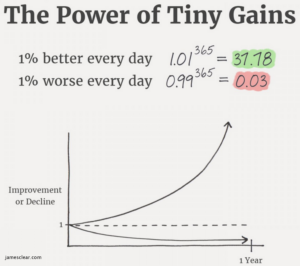There’s Great Power Behind Stackable Leadership Habits
Today’s Tuesday Reading is from Marcia Dority Baker, Program Leader and Leadership Coach at MOR Associates. Marcia may be reached at [email protected] or via LinkedIn.
One of my favorite times is the first few days of January; there is hope for a new year, with lots of potential and the unease of what’s around the corner! While we can have a similar experience at other times of the year, there’s something exciting about turning the calendar from one year to the next. But let’s be honest: January is also a time of disappointment and frustration. Many people set goals to change something we don’t like about ourselves or get started on something we think we should do. What if we quit doing the thing that hasn’t worked and try something new? Albert Einstein, one of the smartest men in the world, is thought to have said, “Insanity is doing the same thing over and over and expecting different results.”
What leadership habits have you practiced for 3+ years?
Sometimes, getting started is the hardest part of doing anything. A healthy approach to making changes in habits begins with reflection. What habit(s) have you practiced for three or more years? By pausing to list those regular habits, we can see what and where we have built a good foundation. Be as specific as possible when documenting your habits. A simple list or daily column is an excellent start to visualize your habits. For instance, if you brush your teeth in the morning and before bed each night or drink coffee or tea in the morning. No matter what or where you may be (home or while traveling), these are items you do.
People do not decide their futures, they decide their habits and their habits decide their futures. – F.M. Alexander
Outcomes. Processes. Identity. What are you?
Research on habits has found that people change for two types of reasons. The first is an outcome change or what one wants to achieve. This can be a big goal, such as running a marathon or writing a book. The second reason for change is a change in identity; this habit helps you become who you want to be. For instance, this is seeing yourself as a runner because you are training for a race or a writer because you write daily. Our habits shape our identity and the habits we practice become our future. Knowing how to modify our habits therefore leads to success. To change the outcome, one must adjust their identity, but to do this successfully, we need to modify our processes.
Stackable Leadership Habits
One approach to creating sustainable change is to modify our processes or leadership habits. The premise of stackable leadership habits is building a new habit on an existing habit. So, back to that list of daily habits that one has practiced for a few years, where are some existing leadership habits that can be used to adjust a habit to focus on who you want to become? To move to your desired future state, what habit can you stack with an existing habit? Many people need more motivation and clarity on what they want to accomplish. By being specific about what one wants to achieve, for instance, not just to write a book but to be a writer, habit stacking can accomplish the goal. Based on the work of James Clear, the formula for stacking habits is: after I (CURRENT HABIT), I will (NEW HABIT). For instance, if mornings are when one is most mentally active, then stacking a habit on a morning routine is optimal. Instead of saying, I will write each morning, which is vague, be specific; after I open the lid of my laptop, I will write for 10 minutes each day during the work week.
Starting A Streak or a Chain
I have some runner friends with running streaks that seem outrageous to me. One friend runs a 5K (3.1 miles) each day in December, another runs at least a mile every day for an entire year, and several will run their age in miles (or kilometers after a specific birthday) to celebrate their birthday each year. The common denominator in this is the streak – once you start on something, it’s harder to break the streak, especially if you mark it on the calendar.
A critical step in the stackable leadership habits formula, after I (CURRENT HABIT), I will (NEW HABIT), is not to break the chain. As James Clear notes in his book Atomic Habits, as humans, we want to see immediate benefits when setting a goal. While a long-term habit leads to success, we need the daily dopamine reminder to keep at it. By marking one’s accomplishment on a calendar (print or digital), breaking the routine chain (or streak) one has going is harder.

Small changes in our leadership habits, consistently followed over time, can produce tremendous outcomes. One of the core concepts in our MOR Leaders programs is how to change a habit. We discuss the power of habits during the first workshop to set the stage for success with our goals for the program. Actions such as defensive calendaring, Monday morning strategy, and Friday reflections are based on modifying our behavior or using existing habits to build new, stronger leadership habits. The bottom line is that to change a habit or to shift our mindset on a practice (Identity or Outcome), one must be intentional about the “why.” Take a few minutes of I-Time to reflect on what you want to accomplish as a practice and why this is important to you. What new habit can you stack on an existing habit to start a chain of success? And finally, how will you track your habit (print or digital) so that you can see your progress?
Further Reading
Atomic Habits: How to Get 1% Better Every Day – James Clear, YouTube
Habit Stacking: How to Build New Habits by Taking Advantage of Old Ones, James Clear
The Power of Habit, Charles Duhigg
The Duolingo effect: How keeping the ‘streak’ is changing people’s behavior, Fast Company

What stackable leadership habits can you commit to developing based on an existing habit?
Last week, when considering our individual leadership journeys, we asked when you think an inflection point in your leadership journey first occurred.
- 23% said before high school
- 17% said high school
- 15% said college
- 23% said on the job
- 11% said parenting
- 11% said other or none

Inflection points in our leadership journey, when we see new possibilities in new ways, first happen in various life stages for us, including almost one in four of us being on the job. This underscores the importance of our openness across life to the leadership lessons available for our learning, and the responsibility when we think about how we can enable such experiences for others.
- December 2025 (3)
- November 2025 (5)
- October 2025 (5)
- September 2025 (5)
- August 2025 (7)
- July 2025 (5)
- June 2025 (4)
- May 2025 (5)
- April 2025 (5)
- March 2025 (4)
- February 2025 (4)
- January 2025 (4)
- December 2024 (3)
- November 2024 (4)
- October 2024 (5)
- September 2024 (4)
- August 2024 (4)
- July 2024 (5)
- June 2024 (5)
- May 2024 (4)
- April 2024 (5)
- March 2024 (5)
- February 2024 (4)
- January 2024 (6)
- December 2023 (3)
- November 2023 (4)
- October 2023 (5)
- September 2023 (4)
- August 2023 (4)
- July 2023 (4)
- June 2023 (4)
- May 2023 (5)
- April 2023 (4)
- March 2023 (1)
- February 2023 (1)
- January 2023 (4)
- December 2022 (3)
- November 2022 (6)
- October 2022 (4)
- September 2022 (4)
- August 2022 (6)
- July 2022 (4)
- June 2022 (4)
- May 2022 (5)
- April 2022 (4)
- March 2022 (4)
- February 2022 (3)
- January 2022 (4)
- December 2021 (3)
- November 2021 (4)
- October 2021 (3)
- September 2021 (4)
- August 2021 (4)
- July 2021 (4)
- June 2021 (4)
- May 2021 (4)
- April 2021 (4)
- March 2021 (5)
- February 2021 (4)
- January 2021 (4)
- December 2020 (4)
- November 2020 (4)
- October 2020 (6)
- September 2020 (5)
- August 2020 (4)
- July 2020 (7)
- June 2020 (7)
- May 2020 (5)
- April 2020 (4)
- March 2020 (5)
- February 2020 (4)
- January 2020 (4)
- December 2019 (2)
- November 2019 (4)
- October 2019 (4)
- September 2019 (3)
- August 2019 (3)
- July 2019 (2)
- June 2019 (4)
- May 2019 (3)
- April 2019 (5)
- March 2019 (4)
- February 2019 (3)
- January 2019 (5)
- December 2018 (2)
- November 2018 (4)
- October 2018 (5)
- September 2018 (3)
- August 2018 (3)
- July 2018 (4)
- June 2018 (4)
- May 2018 (5)
- April 2018 (4)
- March 2018 (5)
- February 2018 (5)
- January 2018 (3)
- December 2017 (3)
- November 2017 (3)
- October 2017 (5)
- September 2017 (3)
- August 2017 (5)
- July 2017 (3)
- June 2017 (8)
- May 2017 (5)
- April 2017 (4)
- March 2017 (4)
- February 2017 (4)
- January 2017 (4)
- December 2016 (2)
- November 2016 (7)
- October 2016 (5)
- September 2016 (8)
- August 2016 (5)
- July 2016 (4)
- June 2016 (12)
- May 2016 (5)
- April 2016 (4)
- March 2016 (7)
- February 2016 (4)
- January 2016 (10)
- December 2015 (4)
- November 2015 (6)
- October 2015 (4)
- September 2015 (7)
- August 2015 (5)
- July 2015 (6)
- June 2015 (12)
- May 2015 (4)
- April 2015 (6)
- March 2015 (10)
- February 2015 (4)
- January 2015 (4)
- December 2014 (3)
- November 2014 (5)
- October 2014 (4)
- September 2014 (6)
- August 2014 (4)
- July 2014 (4)
- June 2014 (4)
- May 2014 (5)
- April 2014 (5)
- March 2014 (5)
- February 2014 (4)
- January 2014 (5)
- December 2013 (5)
- November 2013 (5)
- October 2013 (10)
- September 2013 (4)
- August 2013 (5)
- July 2013 (8)
- June 2013 (6)
- May 2013 (4)
- April 2013 (5)
- March 2013 (4)
- February 2013 (4)
- January 2013 (5)
- December 2012 (3)
- November 2012 (4)
- October 2012 (5)
- September 2012 (4)
- August 2012 (4)
- July 2012 (5)
- June 2012 (4)
- May 2012 (5)
- April 2012 (4)
- March 2012 (4)
- February 2012 (4)
- January 2012 (4)
- December 2011 (3)
- November 2011 (5)
- October 2011 (4)
- September 2011 (4)
- August 2011 (4)
- July 2011 (4)
- June 2011 (5)
- May 2011 (5)
- April 2011 (3)
- March 2011 (4)
- February 2011 (4)
- January 2011 (4)
- December 2010 (3)
- November 2010 (4)
- October 2010 (4)
- September 2010 (3)
- August 2010 (5)
- July 2010 (4)
- June 2010 (5)
- May 2010 (4)
- April 2010 (3)
- March 2010 (2)
- February 2010 (4)
- January 2010 (4)
- December 2009 (4)
- November 2009 (4)
- October 2009 (4)
- September 2009 (4)
- August 2009 (3)
- July 2009 (3)
- June 2009 (3)
- May 2009 (4)
- April 2009 (4)
- March 2009 (2)
- February 2009 (3)
- January 2009 (3)
- December 2008 (3)
- November 2008 (3)
- October 2008 (3)
- August 2008 (3)
- July 2008 (4)
- May 2008 (2)
- April 2008 (2)
- March 2008 (2)
- February 2008 (1)
- January 2008 (1)
- December 2007 (3)
- November 2007 (3)
- October 2007 (3)
- September 2007 (1)
- August 2007 (2)
- July 2007 (4)
- June 2007 (2)
- May 2007 (3)
- April 2007 (1)
- March 2007 (2)
- February 2007 (2)
- January 2007 (3)
- December 2006 (1)
- November 2006 (1)
- October 2006 (1)
- September 2006 (3)
- August 2006 (1)
- June 2006 (2)
- April 2006 (1)
- March 2006 (1)
- February 2006 (1)
- January 2006 (1)
- December 2005 (1)
- November 2005 (2)
- October 2005 (1)
- August 2005 (1)
- July 2005 (1)
- April 2005 (2)
- March 2005 (4)
- February 2005 (2)
- December 2004 (1)